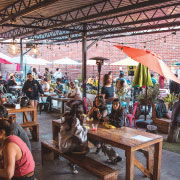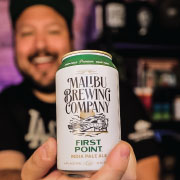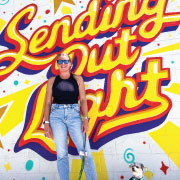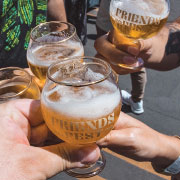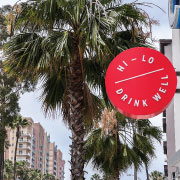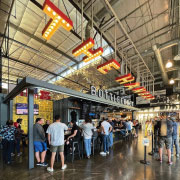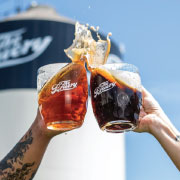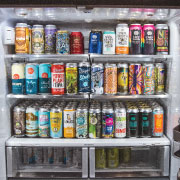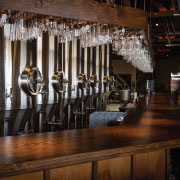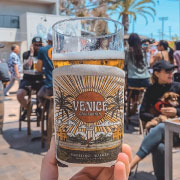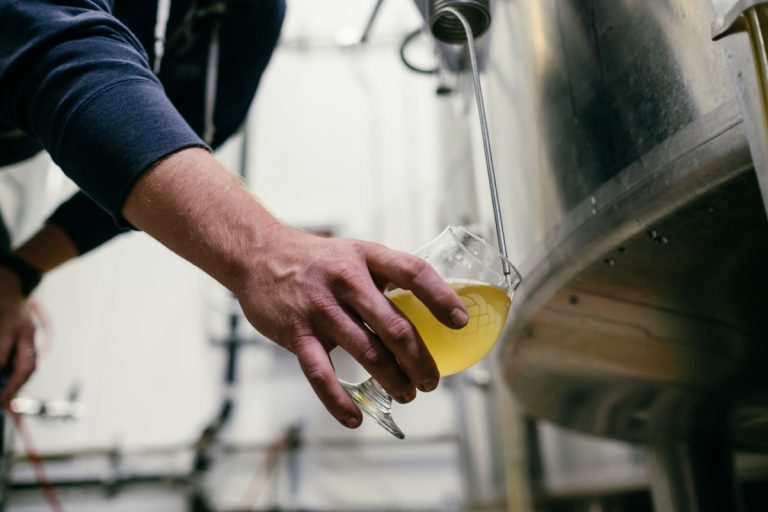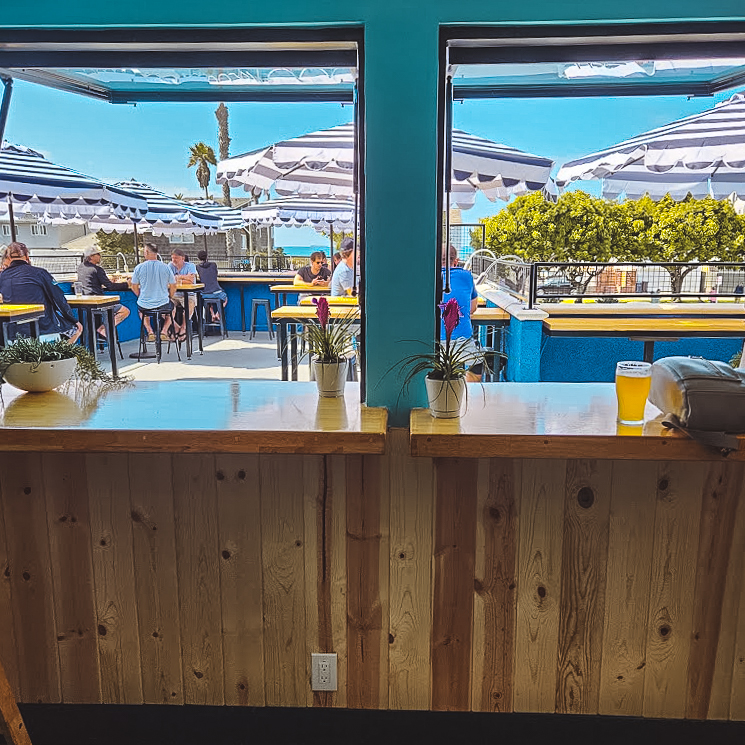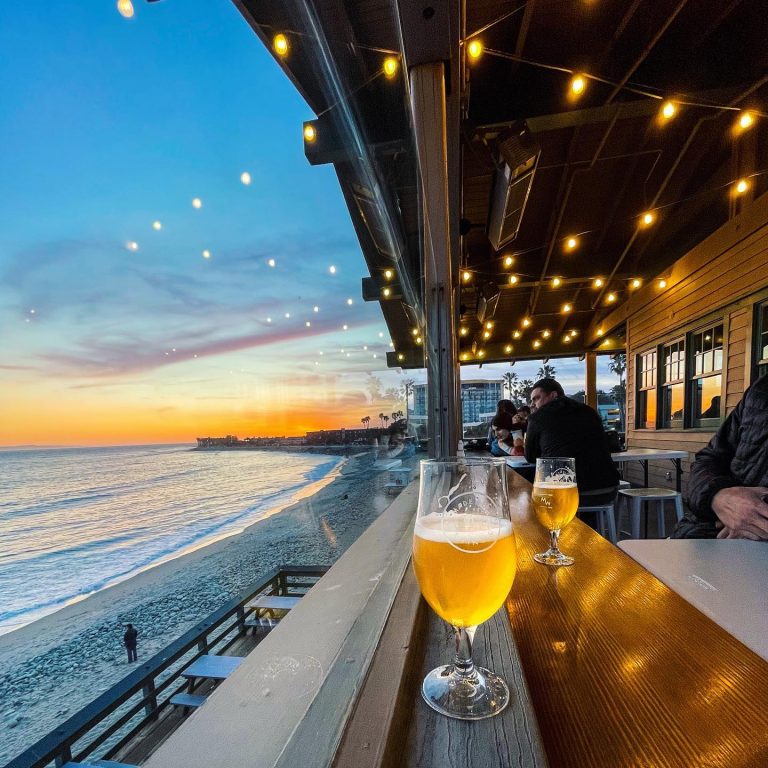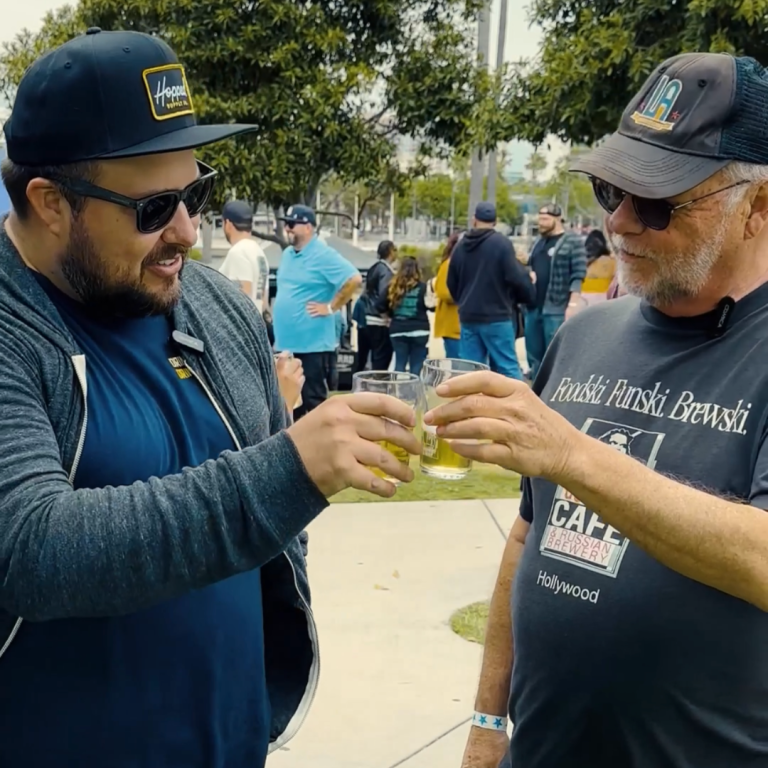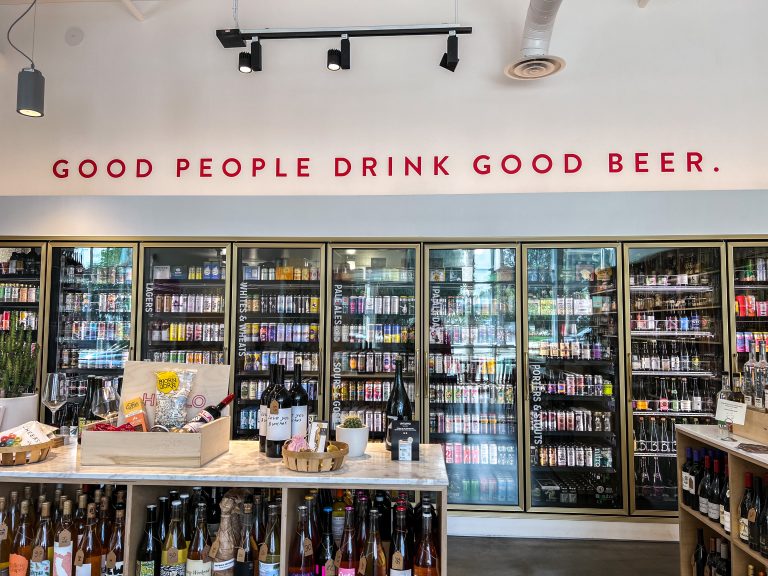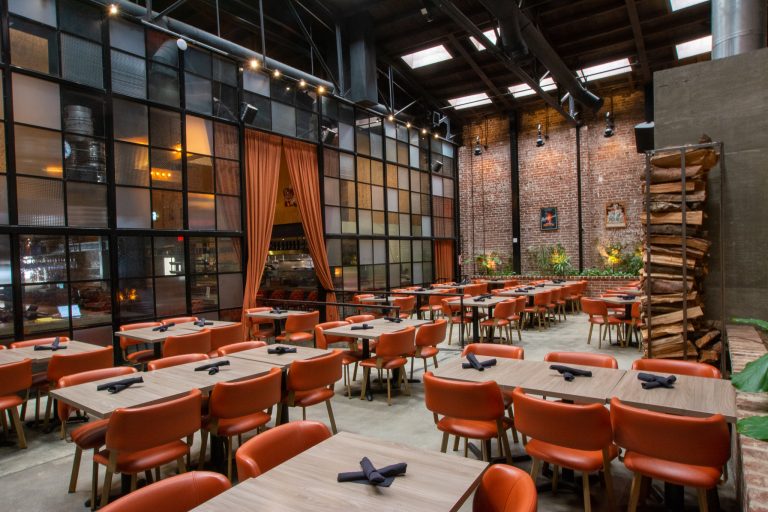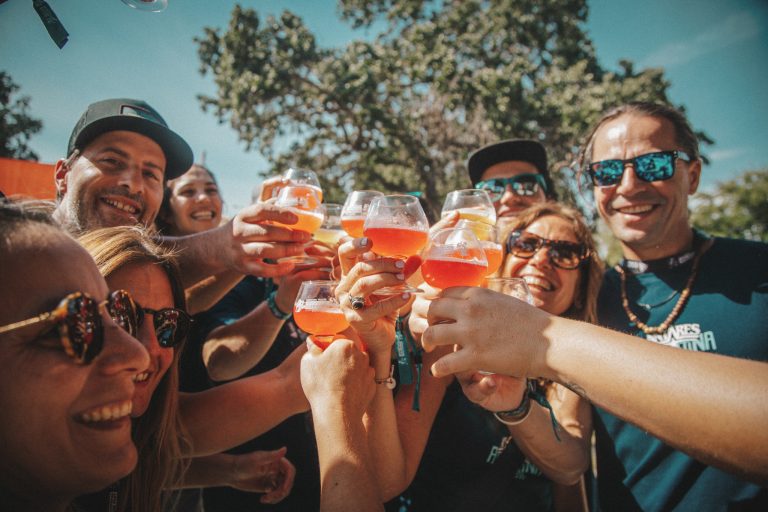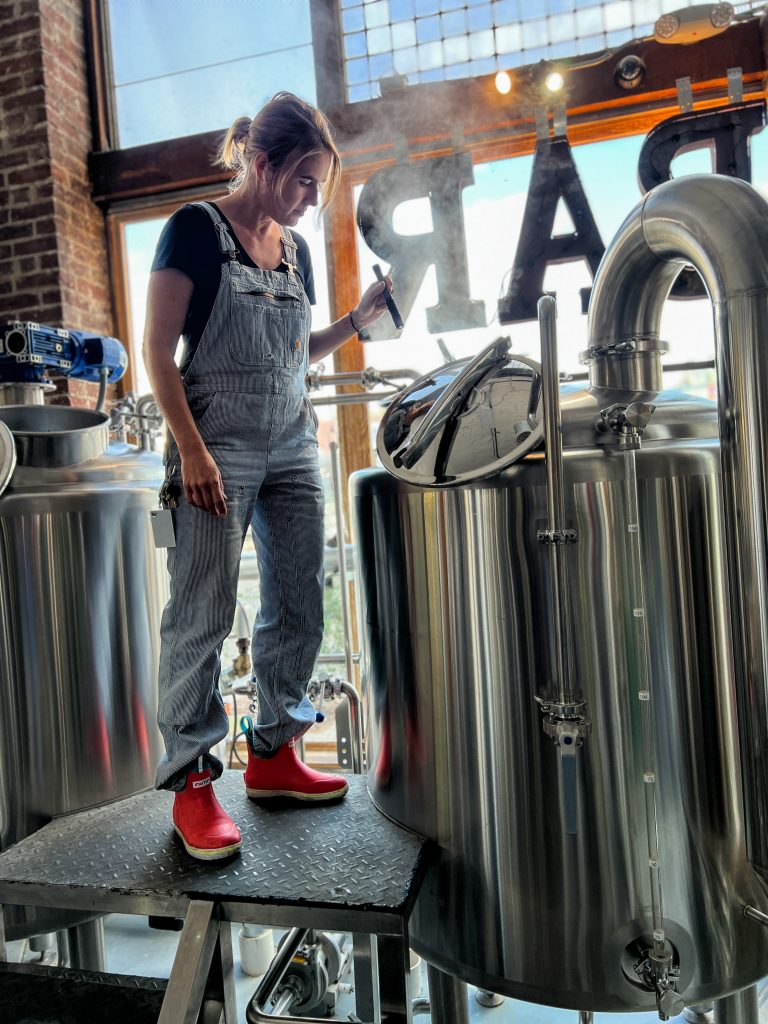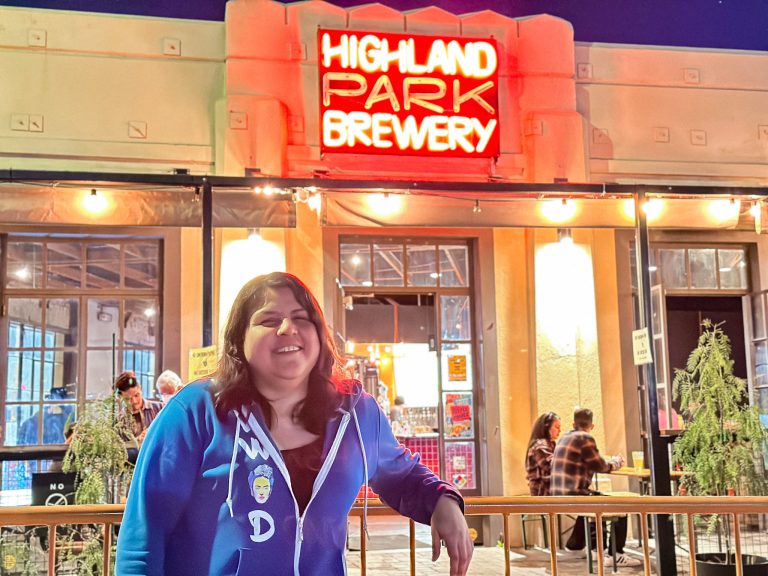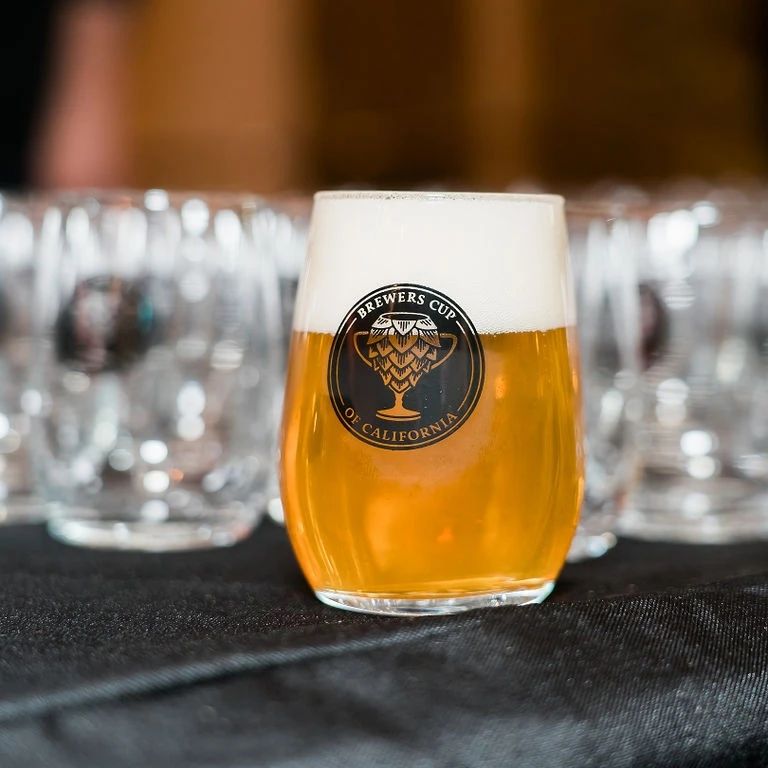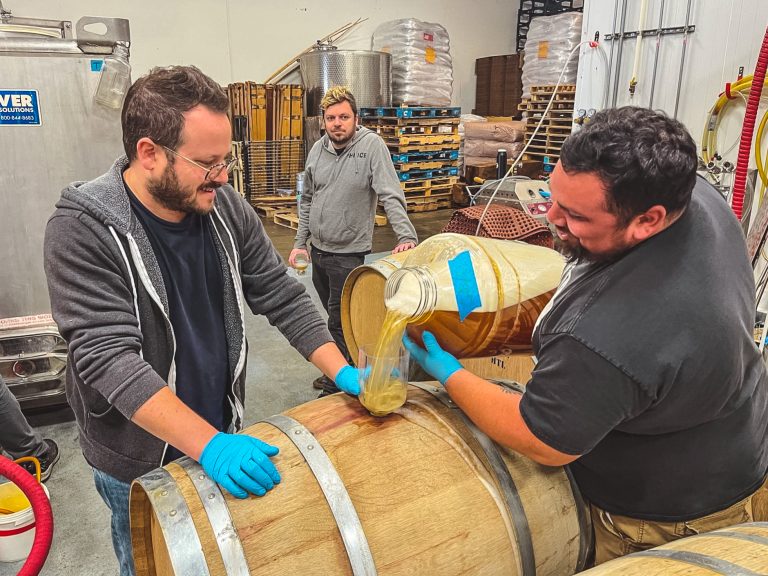Much like sneakerheads and Raiders fans, craft beer aficionados are a select, specific bunch: we will stand on lines for hours and are loyalists no matter the circumstance. Amid the coronavirus outbreak, those lines have gone virtual and our dedication to the craft has resulted in dropping stimulus checks on four-packs and crowlers.
Most brewery owners had been watching the news closely well before March 15, when Los Angeles Mayor Eric Garcetti announced temporary restrictions on restaurants and bars, resulting in takeout and delivery-only for breweries. “I try to look at things globally and not be so consumed by a smaller, immediacy view,” Highland Park Brewery owner and head brewer Bob Kunz tells Hopped LA. “Even before we made any major transitions, I could just feel the tidal wave coming.”
Taprooms have become a major part of craft beer culture, but suddenly, social gatherings were off-limits and a huge piece of revenue was cut from businesses where margins are already narrow. Pivoting to new moneymaking models hasn’t been easy, but the pandemic has brought out ingenuity in both craft beer lovers and brewery owners. Delivery services, which had always been legal but rarely feasible, were now practical ways to safely get beer into the hands of consumers. Online shops got up and running in two days or less. Crowlers became the go-to way to quickly sell fresh suds to avoid dumping full kegs, giving patrons an at-home alternative to a fresh pint straight from the tap.
Two months into “Safer at Home,” the majority of the Los Angeles County breweries are still up-and-running in some capacity, with Pomoma’s Sanctum Brewing becoming the first and only one so far to announce its permanent closure. While there has been some tapering off of sales, beer lovers are still clamoring to get fresh suds and spend money locally. That, and we need beer to get us through every day ending in -day right now.
At Hopped LA, we aim to focus on the positive stories as best we can during these trying times. Here’s how four of our local breweries are navigating the pandemic.
Highland Park Brewery (Chinatown and Highland Park)
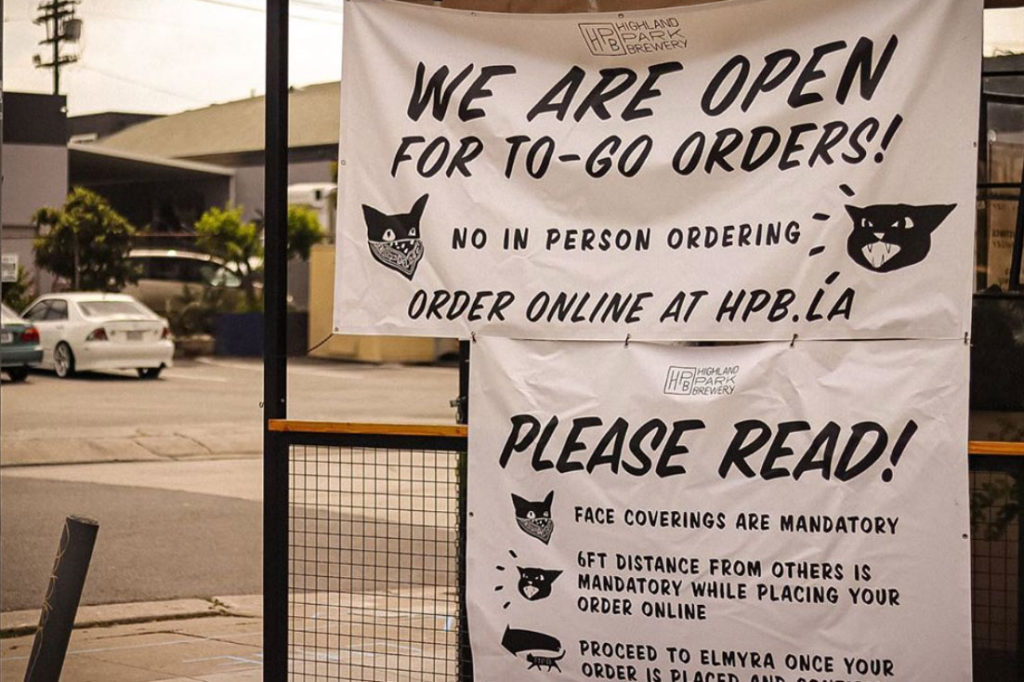
Lines are drawn six-feet apart on the sidewalk along Elmyra Street, where a sign asks you to text a number to pick-up your online order. A beertender in a face mask and latex gloves, and most likely a baseball cap, will then hand you a brown paper bag with your receipt stapled to the front. No one can tell if either you or the HPB employee is flashing a smile, but let’s assume both are.
To Kunz, the credit for these smooth transactions goes entirely to the leadership team he’s put together since opening HPB’s Chinatown space in 2018, which includes a taproom general manager, chef, director of brewing, and marketing and sales manager. “I think we were very fortunate that we’ve been working towards building this team, and that there’s so many great people on it that we’re able to step up and put thought and energy into this to move fast. And it’s been stressful,” Kunz admits. “You can just feel the wear on our team, because you’re forced to be in this constant state of using your brainpower, which just takes everything out of you.”
The team began adjusting the weekend before city and state orders went into place. Capacity in Chinatown was limited to 100 people that Friday and Saturday, but large groups were still coming in, bumping into neighbors and sharing glasses. On Sunday, they cut the limit to 50 patrons, which Kunz says still felt crazy even though it was “sparse” because “we felt it was real and it was coming.” By that night, breweries were among the businesses forced to partially close, and HPB began pick-ups the next day, with online ordering following 48 hours later. They’ve since enacted daily local deliveries and shipping throughout California for a flat rate of $20.
“We got our system down where nobody was coming on our premise, everything was online, and we had contactless for everything,” he says. “In addition to that, it’s this crazy game of juggling our employees’ and customers’ health, government mandates and regulations, and the health and survival of the business. You can’t make a shift on any of those without it affecting the other.”
Kunz has a fairly philosophical take on current world orders. “It’s this amoeba that’s every day. It’s kind of fascinating because prior to all this happening, I’d been thinking a lot about complexity and the modern world and that we’re in this information age where success as a modern business is being able to evolve rapidly because information travels so fast,” he muses. “Then in this very short five-day time span, we did a 180 and changed our business model. At the end of last year, we identified our primary business as providing a gathering space for large groups, and then overnight it was like, well, I guess that has to end.”
The brewing process has also gone through major shifts, as they aren’t currently able to package beers coming out of the original Highland Park facility in The Hermosillo. All production there has halted and 15-barrel fermenters were moved to Chinatown in order to keep the same yeast schedule and package beers that had been planned months earlier. Kunz estimates that Chinatown is now at 60 to 75 percent of the production they were pre-coronavirus, which he says is “pretty amazing” because 80 percent of sales had been draft and now 90 percent are cans, with the remaining flow going into crowlers.
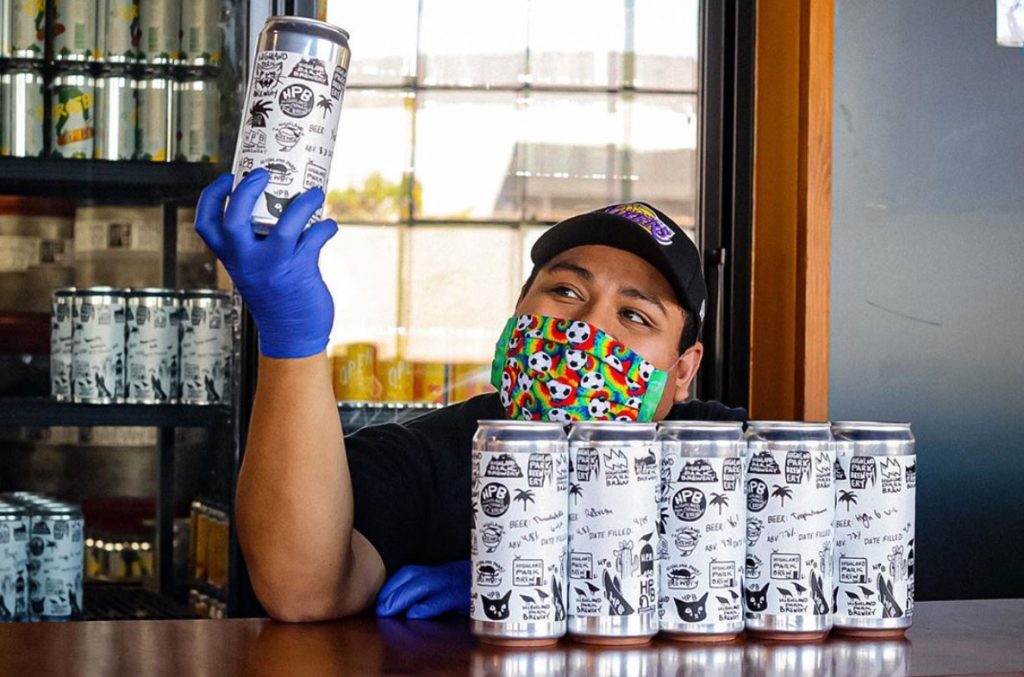 At the beginning, HPB saw a roughly 15 percent drop in business, an “especially challenging wave you’re kind of riding week to week.” Then in mid-April, sales took an unexpected upturn. “I don’t know if that is a shifting psychology of our customers, our beer releases, or that we increased our delivery radius, but for me, it’s a time to think and act creatively. My goal has been, if we can break even or just stop the bleeding as much as possible, so that it’s only losing a little bit of money every week, then we can survive it.”
At the beginning, HPB saw a roughly 15 percent drop in business, an “especially challenging wave you’re kind of riding week to week.” Then in mid-April, sales took an unexpected upturn. “I don’t know if that is a shifting psychology of our customers, our beer releases, or that we increased our delivery radius, but for me, it’s a time to think and act creatively. My goal has been, if we can break even or just stop the bleeding as much as possible, so that it’s only losing a little bit of money every week, then we can survive it.”
HPB has already been approved for both the CARES Act and Paycheck Protection Program, which makes Kunz feel good about their prospects. “But it’s not a time to rest on your laurels and it’s not a time to bank on government bailout,” he notes. “You have to figure out a way to sustain it. It’s going to be very, very scary times.”
Smog City Brewing (Torrance and Long Beach)
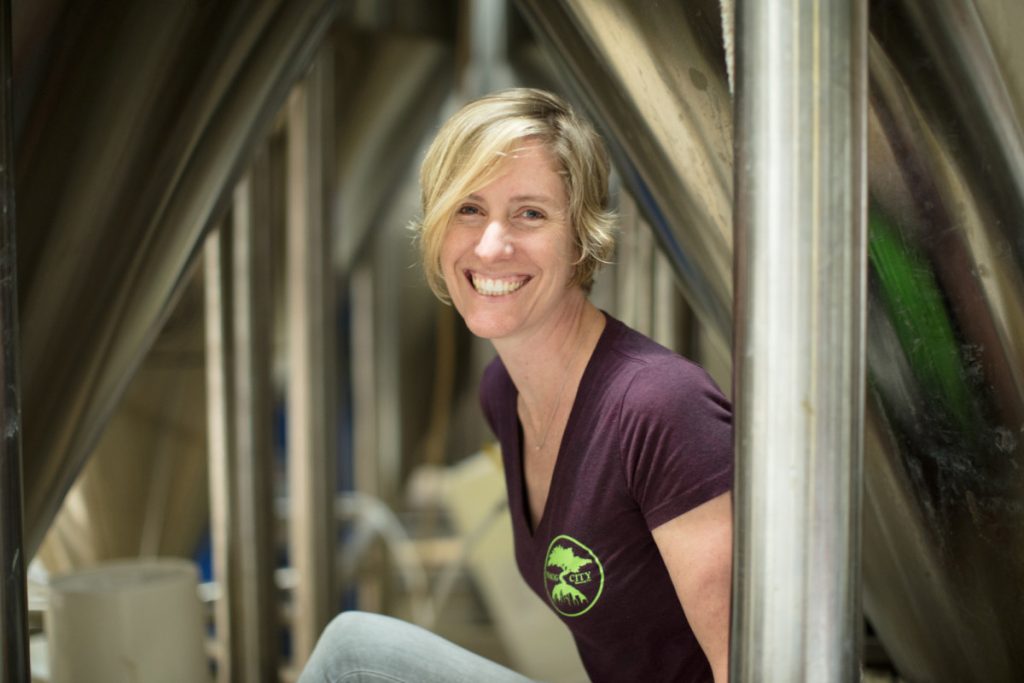
Smog City co-owner Laurie Porter paid very close attention to San Francisco, possibly more so than she ever had. The City by the Bay seemed to be the blueprint for major metropolitan areas’ safety procedures, hinting at what L.A. businesses would be forced to endure next. At the time she spoke to Hopped LA, Smog City had beers fermenting for six to eight weeks that were supposed to go to Disneyland and Coachella. Grains were bought specifically for a “Summer of Lagers,” when a lighter beer would be released every three weeks, and now those malts are just sitting in the brewery. When “Safer in Place” was finally issued in L.A. — or as Porter likes to call it, Hell Day — panic overshadowed her careful planning.
“All of a sudden it was like, oh my god, what does this mean? Are we going to be able to stay open? Are we going to have to close everything? Can we only run certain parts of our business?” She recalls. “A huge positive for my husband and I is we’re really good creative problem solvers. When things get really messed up, this is when we jump into hyper gear and start getting really innovative. My reaction has been both, ‘Oh, we’ve got this,’ and ‘This is totally terrifying.’ There have been plenty of tears — every like four days I have a meltdown. But during the day, I’m in fix-the-problem, come-up-with-solutions, creative-problem-solving mode.”
The first step was to cut the payroll by two-thirds, essentially furloughing everyone and then working back from there to function on a skeleton crew. Porter’s goal was not to make money off the pandemic but to create revenue sources that would keep the business afloat and net-zero. Then, her creativity kicked in; she’s contemplating making hop water, and they’ve packaged the excess oats for customers to purchase. They set up their online delivery in seven hours. Though they wouldn’t have considered delivery before, getting beers to South Bay doorsteps became half of their revenue before even extending to other regions of the county, and Porter thinks it’s very likely that to-go sales will continue through the end of the year, as they’ve upended Smog City’s business model. They’ve even started a Thursday night Zoom happy hour for taproom guests, which Porter calls a “unique and inspiring way to connect with people” currently self-isolating.
“We’re all sort of stuck in our little bubble but the whole point of craft beer is we’re a community, right? We care about each other. We want to be together,” she muses. “And [on Zoom], I was able to see a lot of my regulars and people that come to our taproom, and they can all see each other too. My goal at the end of this crisis is for people to think back on their time at home and remember that we were part of it.”
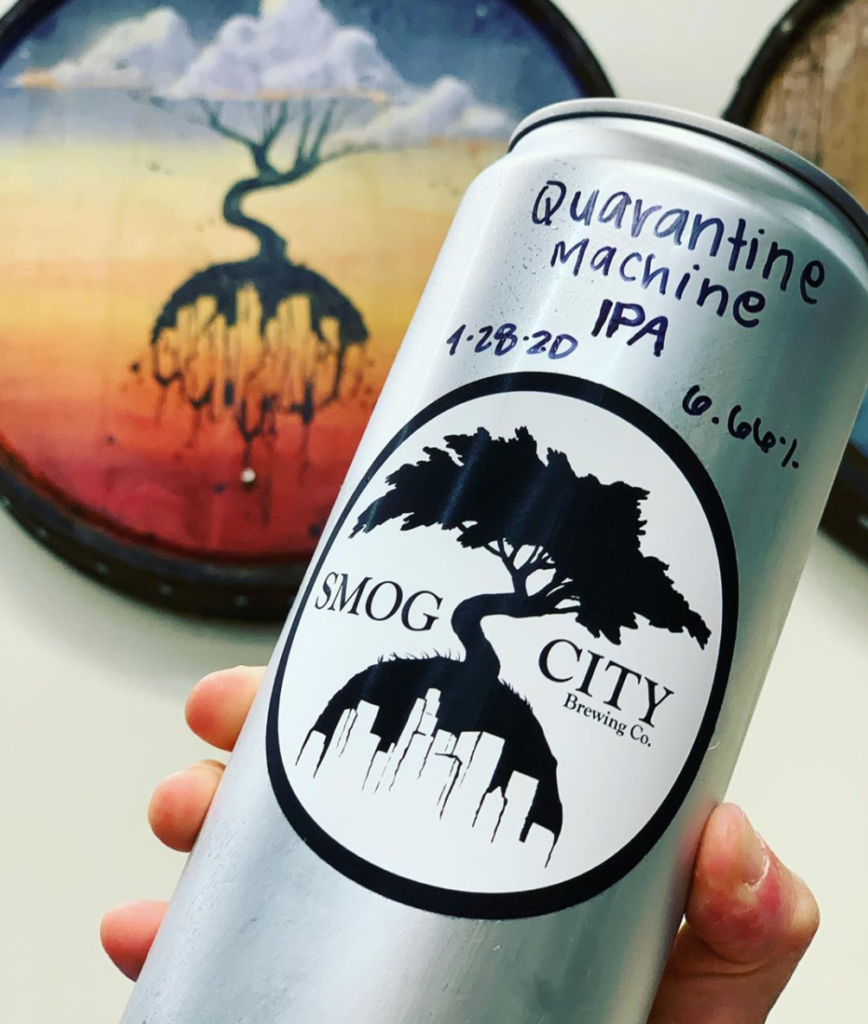 Beer releases also fell victim to COVID-19. An IPA originally deemed Daily Breeze became Quarantine Machine. Roughly two weeks later, The New Normal was released as people began to settle into self-isolation, and both were available in crowlers, and Porter aims to round out the IPA series with one at the culmination of the crisis. Their No. 1 seasonal, Amarilla Gorilla IPA, became Smog City’s first-ever canned beer. Next came From LA Wit Love, a love letter to Los Angeles that was supposed to be a core beer this year but was instead canned and released early, and Kumquat Saison will be available in four-packs just in time for their ninth anniversary celebrations, which were supposed to kick-off in person this week. Taking advantage of a canning line is a new concept for Smog City — the system arrived mere days before stay-at-home orders hit.
Beer releases also fell victim to COVID-19. An IPA originally deemed Daily Breeze became Quarantine Machine. Roughly two weeks later, The New Normal was released as people began to settle into self-isolation, and both were available in crowlers, and Porter aims to round out the IPA series with one at the culmination of the crisis. Their No. 1 seasonal, Amarilla Gorilla IPA, became Smog City’s first-ever canned beer. Next came From LA Wit Love, a love letter to Los Angeles that was supposed to be a core beer this year but was instead canned and released early, and Kumquat Saison will be available in four-packs just in time for their ninth anniversary celebrations, which were supposed to kick-off in person this week. Taking advantage of a canning line is a new concept for Smog City — the system arrived mere days before stay-at-home orders hit.
“From LA Wit Love is fun because, of course, the experiences that we’re having now are really impacting all of our decisions and the way we brand things. The first line of the description is ‘Our Belgian-inspired white ale is a love letter to a city filled with creative and bold inhabitants,’ which we would never have said two months ago,” Porter admits. “But what makes craft beer so amazing is that it is a direct reflection of the time and the experiences of the community. And when I look at L.A., I think man, we are bold. Look at us! We’re kicking the crap out of that curve. We’re doing it because we’re courageous. Even at the risk of the economic impact, we knew that this was what we had to do. So, that’s a genuine feeling that we have for this city; we’re creative people and bold and the way we get through it is to make the right decisions and work hard.”
Currently, Smog City’s focus is on core beers that are still being sent to stores through their distributor rather than working on styles that take longer to brew, as well as keeping up with what’s currently selling best. That means a lot of IPAs, including an upcoming series called “Strange Days” full of DIPAs, triples, and hazies.
Despite fears, Porter’s goal is to ride “this crisis wave” despite the “super scary” situation. “I would call the first week a full-on gut punch, where I felt severe anxiety and was crying and worried about my family’s safety, my employees’ safety, my customers’ safety, my businesses’ safety, but at the same time, I really see this experience as a reset and an opportunity to step back from what was just business as usual and look at my company from a totally new angle,” she says. “We would never have thought that to-go would be such an important part of our business or our customers always thanking us that we’re open and providing a safe place for them. So those things I’m kind of thankful for.”
What helps is that Porter is both an incurable optimist and a realist who believes that there is good that can come out of this. “After this is all over, assuming that Smog City survives, which I believe it will, I feel like we’ll be a stronger, better business,” she says. “I’m not in any way delusional or blind to the fact that there are a lot of people really, really struggling right now, and I don’t think this is a great thing for everybody, but as a business owner, it is my job to do what’s right for my company so that when the crisis is over, there are positions for employees to come back. I have to be a little bit careful about how I look too much at the world because it’s really overwhelming.”
MacLeod Ale Brewing Co. (Van Nuys)
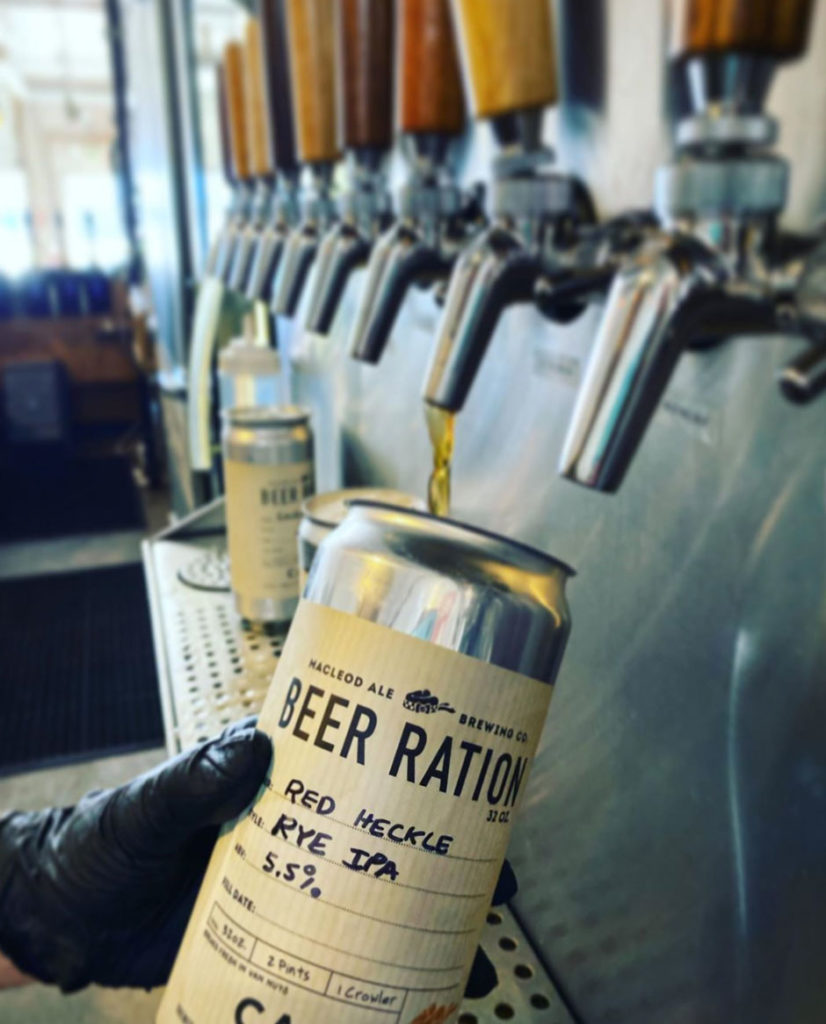
Jennifer Febre knows that owning a business means handling a new problem every day. Coronavirus is that times roughly infinity.
Luckily, she’s got pizza.
MacLeod began offering the bar staple last June, and the co-owner admits that the pies are a big reason she was less worried than other taprooms. Much like Porter, Febre was also focused on San Francisco, noting they were a few steps ahead and stricter than L.A. but considered restaurants viable businesses. “I was pretty confident that we would be allowed to do pizza and beer to-go, so I wasn’t really worried that they were going to close us down completely,” she admits about the Safer at Home orders.
Though MacLeod started brewing mainly cask ales and lagers and is like a Cheers for many U.K. expats (Febre’s husband, co-owner Alistair Boase, is originally from Scotland), with a space that feels like a taproom-turned-British pub, Febre and her team dove headfirst into modern technology. They stopped taking cash transactions in early April before quickly moved to online-only transactions, creating a QR code if someone showed up at the taproom and wanted to order in-person, and they’ve utilized GrubHub for deliveries. Even interacting with regulars has mostly moved online, which Febre admits is “so weird.”
“We just started doing pizza kits, so people will order one, make it, and post a video or pictures and tag us, and we’ll answer them back. I’m having way more interaction with people through Facebook, Instagram and Twitter than I ever did,” she says. “It’s such a hard time. People want to rally to save their local brewery but they might have lost their jobs and don’t have enough money to support them or we’re all being encouraged not to go out and cook at home. Everyone’s having to make very tough decisions.”
Online sales have been going so well that MacLeod briefly sold out of cans, and growlers were depleted within a day during an early free promotion. Cask ales are best consumed on-site and thus were not previously offered for takeaway, but they’re hoping to change that soon with an upcoming, short-term release of mini-ferkins. Febre is constantly checking in with her suppliers to make sure they’ll have everything they need to soldier on.
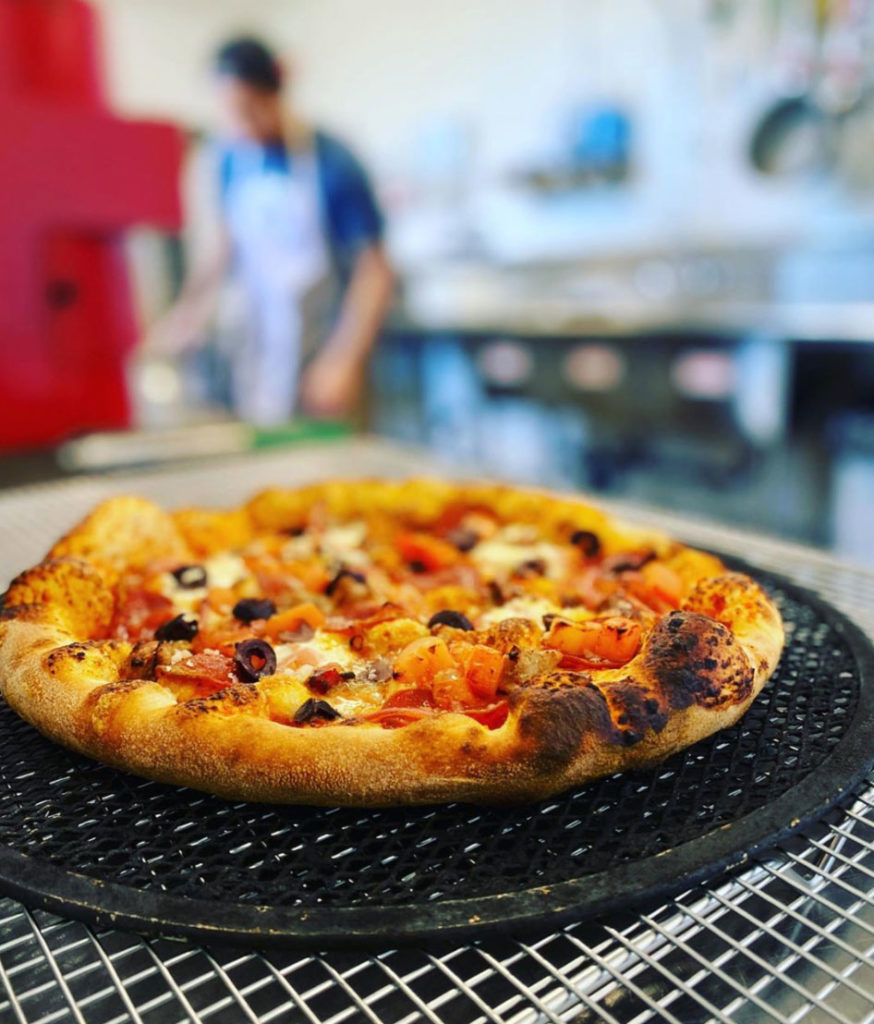
“People are definitely ordering more cans. That’s all they can, right? Cans and growlers. Where a patron normally would have come in and maybe have a pizza and two or three pints, now they’re able to get four or five pizzas and a case of beer, so each individual ticket is more,” Febre says. “But it’s concerning, for sure, if all we can sell is cans and you can’t get the cans. We have plenty of beer — it’s what to put it in that’s the problem.”
When stay-at-home orders first began, Febre’s son, the taproom manager, offered to be the sole front-facing worker and go off payroll to keep the family business afloat. Within two days, Febre realized they needed their staff back, albeit at reduced hours. Distribution has stopped entirely, but their two brewers are still crafting ales and the kitchen staff is busier than ever cranking out pizzas during peak hours. “We’re getting the word out to the community about the pizza and beer deliveries,” she says. “That’s the silver lining, assuming we make it to the other side of this. We’re all very tenacious, but there are realities — there’s math. No guarantees, but I think we have a pretty good chance. We’re pretty optimistic.”
“My heart just breaks for all the small business owners that have been working on restaurants and breweries for a decade or more and putting every penny, every ounce of energy, every bit of creativity, every bit of tenacity into them, and here we are,” she adds. “Something like this could just turn off the switch.”
Long Beach Beer Lab (Long Beach)

The Long Beach Beer Lab has become a bodega. This was not what Levi Fried originally envisioned when he and wife Harmony Sage returned to his hometown of Long Beach from Israel to open a brewery and bakery, but the former doctor, whose beers are deeply steeped in science, has had years of experience in meticulous problem-solving.
Fried is proud of being from the blue-collar port city with its hard-working, “salt of the earth” people who embraced his vision for pilsners and lagers alongside barrel-aged wild ales. That kinship is helping LBBL not just survive but thrive, though Fried admits it was a “whirlwind” and “freestyle” to transform into a pantry with to-go beer and food sales.
He and Sage took a week to figure out how to proceed. First, they hired extra help at their coffee shop, the Long Beach Bread Lab Cafe on the Long Beach MemorialCare Campus, to take over for employees who didn’t feel comfortable working at the hospital and account for extended hours to serve healthcare workers. At the same time, they saw an increase in brewery and pizza takeout, which they originally expected to be minimal, so they slowly started rehiring their original staff at the main location and worked on rehauling their website. Once stay at home orders took place, a councilman-adjacent community member asked Fried if LBBL had pantry items like milk and eggs that they could sell, which they did because Sage runs her bakery in the same building as the taproom. That woman helped grant a temporary convenience store license that insured LBBL remains essential.
“We took all of the wire racks that we had for merch and dry goods and we filled them with paper towels and flour and yeast and milk and eggs, and that’s when all hell broke loose,” Fried admits. “We got inundated like crazy with support from the community, and we tripled and quadrupled our capacities to do business over and over again in the weeks after that. Everybody’s buying a pound of flour and a four-pack, so we’ve been able to join all of these things together.”
Pantry staples sold so well that LBBL hired more people in the baking facility to help with the bread shortage, and Sage and her team created DIY kits with sourdough starters, salt, and her yeast book as a guide to bake at home, followed by a sourdough pizza kit.
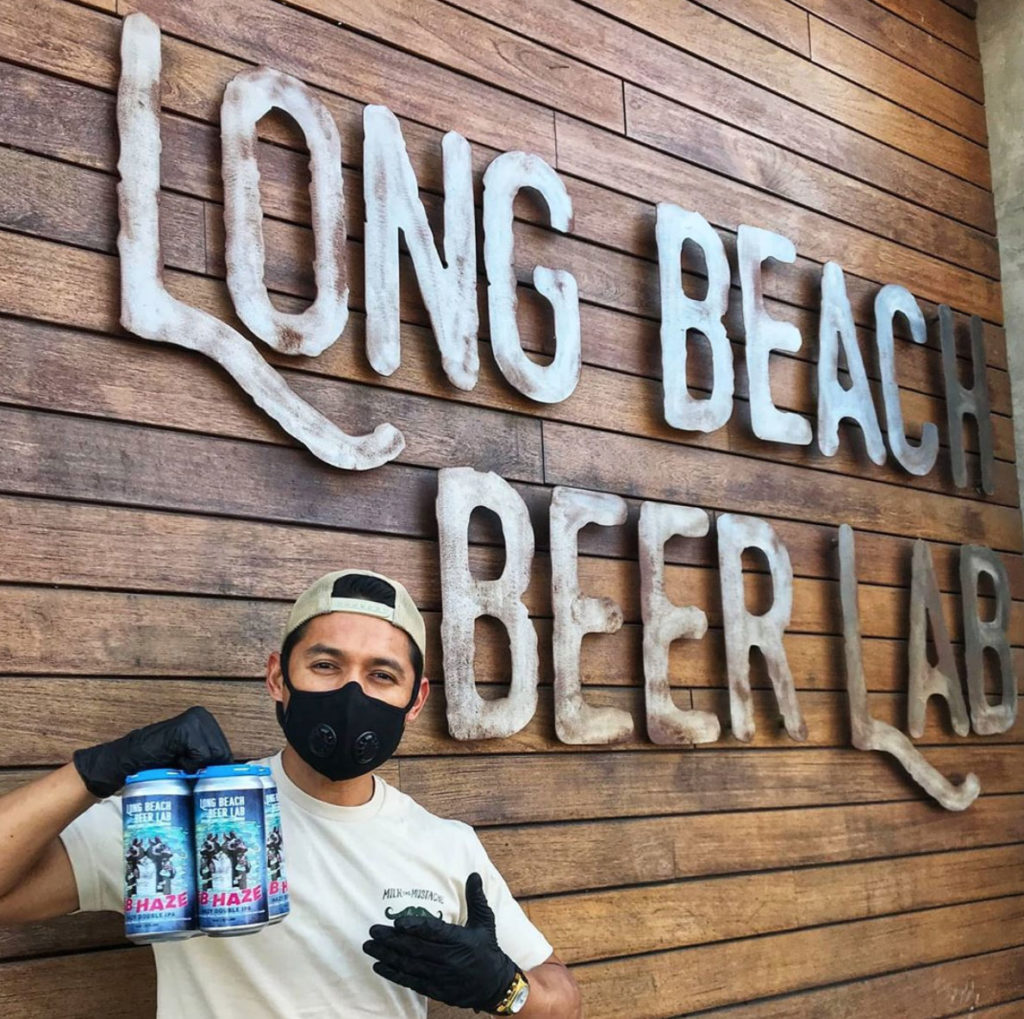
“It just seems that everybody’s been embracing us, and I do believe that because of the community support that we’re lending, they want to support a brewery with this kind of faculty,” Fried muses. “We started doing video tutorials and the hospital pay it forward [where customers can buy healthcare workers baked goods], and people are loving those. It’s just been really nice to be able to give back and that we have the ability to do those things.”
As for the beer itself, LBBL is brewing at-capacity with minimal distribution, and they’ve brought on two more brewers to help produce “non-stop,” which Fried admits is “amazing and we’re very fortunate.” They’re brewing with kviek yeast and turning beers around within a week, which has allowed them to increase to four-to-five times their original brewing schedule, and they’re packaging 16-oz. cans every other day on their own manual packing system. The aim is to produce directly into four-packs, ensuring beer is fresher than if they went into kegs first and has kept down the labor of cleaning both kegs and filling crowlers. Delivery began recently, and Fried is looking into shipping possibilities and distributing to bottle shops and liquor stores.
Still, it’s hard to look too far into the future.
“I like to believe that everything will go back to normal but in some capacity, it will never be normal. I don’t think that that’s gonna be for a long time, just based on my personal and professional medical opinion,” Fried says. “So, for the time being, we’re going to focus on four-packs. I don’t think we’ll ever go back to the pure brewing-and-gastropub model that we were doing previously, because I think the community demands something different from us now knowing that we can fulfill the needs, and I do think that we now have the infrastructure set up for distribution, takeaway, and convenience store provisions. That will always stick with us, and we’ll incorporate the brewpub experience back into our current business.”
LBBL has cultivated very bright spots during these dark times, which may include quite a few brewery closures as the year stumbles on.
“You’re seeing that now more than ever with the stay at home, people aren’t traveling out to the industrial parks for beers unless the beers are exceptional. They’re really rallying around the neighborhood breweries and the ones that they want to see, and ultimately, they don’t see the other ones or they don’t care to see them,” Fried says. “I think it has accelerated the bubble bursting, but at the same time, it’s also accelerated the regrowth, and that’s the positive thing you’re seeing. We’re lucky to be one of the fortunate ones to come out on the upside of all of this so far. I’m very fortunate for the community that has rallied behind us.”
